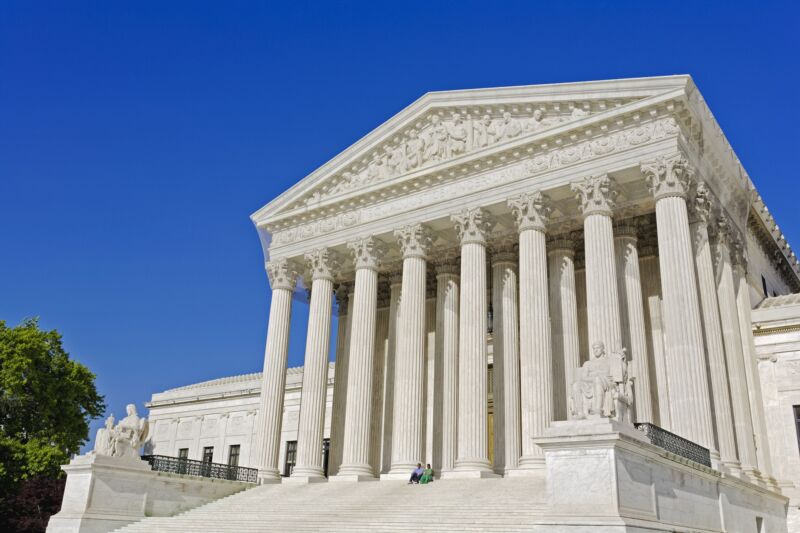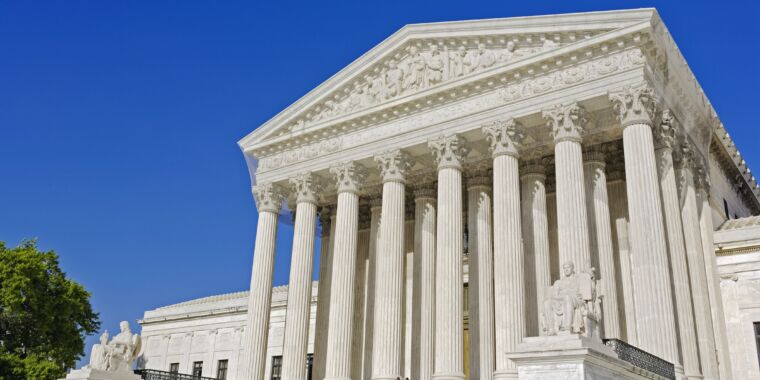
Getty Images | Rudy Sulgan
Florida yesterday asked the US Supreme Court to reinstate its social media regulation law that made it illegal for sites like Facebook and Twitter to ban politicians.
Florida’s petition said the Supreme Court should answer the questions of whether the First Amendment prohibits states “from requiring that social-media companies host third-party communications, and from regulating the time, place, and manner in which they do so,” and whether the First Amendment prohibits states “from requiring social-media companies to notify and provide an explanation to their users when they censor the user’s speech.”
The Florida law is currently blocked by an order issued by the US Court of Appeals for the 11th Circuit, which made its ruling in a lawsuit filed by Big Tech industry groups. Florida filed its Supreme Court petition several days after a Texas social media law was reinstated by the US Court of Appeals for the 5th Circuit.
Florida’s petition points to the contrasting decisions by the 5th and 11th Circuit courts as evidence that the Supreme Court should settle the over-arching questions relevant to both cases. Florida said the case over its own law is “an ideal vehicle” for considering “whether social-media platforms are ‘speaking’ when they host third-party speech.”
A previous 5th Circuit ruling in the Texas case was vacated by the Supreme Court in May, suggesting the states face an uphill battle. The governors of Florida and Texas have both argued that state laws are needed to prevent censorship of conservatives on social media.
The Big Tech industry groups that sued Florida also said they want the Supreme Court to decide the case.
Florida wants common-carrier rules for social networks
Florida told the Supreme Court the “Eleventh Circuit erred at the outset when it concluded that the hosting regulations in Florida’s social-media law triggered heightened First Amendment scrutiny.” Florida also said the court “erred in its alternative holding that the platforms’ hosting decisions were inherently expressive.”
“Next, the Eleventh Circuit erroneously concluded that Florida could not regulate social-media platforms as common carriers, and in doing so, require the platforms to openly accept users,” Florida argued. The state pointed to Supreme Court Justice Clarence Thomas’ opinion backing the idea that social media companies can be treated as common carriers.
The Florida law says a social media platform “may not willfully deplatform a candidate for office” and imposes fines of up to $250,000 per day on social media companies that ban candidates for elected office. The law also says social platforms “may not apply or use post-prioritization or shadow banning algorithms for content and material posted by or about… a candidate,” and may not “censor, deplatform, or shadow ban a journalistic enterprise based on the content of its publication or broadcast.”
The Florida law originally had a “theme park” exemption for Disney, but the state legislature and Governor Ron DeSantis eliminated the exemption in April.
The Texas law says a “social media platform may not censor a user” based on the user’s “viewpoint” and defines “censor” as “block, ban, remove, deplatform, demonetize, de-boost, restrict, deny equal access or visibility to, or otherwise discriminate against expression.”








